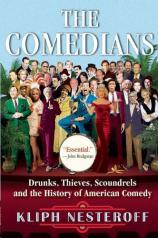The Comedians: Drunks, Thieves, Scoundrels, and the History of American Comedy
Review
The Comedians: Drunks, Thieves, Scoundrels, and the History of American Comedy
Steve Martin titled his third album Comedy is Not Pretty. One could easily see the same sentiment used for Kliph Nesteroff’s new book on the art form.
THE COMEDIANS is a thoughtful and well-documented history. We are reminded of --- or, in some cases, introduced to --- the likes of Jack Benny, Milton Berle, Sid Caesar, Bob Hope, the Marx Brothers and the Smothers Brothers. But it is a world fans might not want to see if they’re not interested in “seeing how the sausage is made.” The practitioners are portrayed, in great part, as mean, selfish, paranoid, substance-addicted, misanthropic and misogynistic (since most of the personalities herein are male). They gossip like magpies, only too happy to dish the dirt on their fellow comics, to the degree that one has to wonder if the stories are actually true or if these old veterans just have axes to grind.
"THE COMEDIANS is a thoughtful and well-documented history.... Perhaps the most interesting stories in THE COMEDIANS deal with the counterculture of the 1960s and 1970s."
The majority of THE COMEDIANS is devoted to the “pioneers,” progressing from vaudeville to night clubs --- many of which were owned by members of organized crime in New York, Miami and Las Vegas --- to the progression of the phenomenon of late night talks shows. Many comedians got their big breaks with programs hosted by Steve Allen, Jack Paar, Dick Cavett and Johnny Carson. The trend continued with David Letterman, who himself got his introduction to a national audience through Carson’s “Tonight Show.”
It is interesting to note that, just like life itself, older generations blamed newer ones for ruining the great traditions. Radio spelled the doom of vaudeville, television killed radio, and so on. It is also worth pointing out that the book practically ignores sitcoms, so there are no anecdotes about such classics as “I Love Lucy,” “The Brady Bunch” and “Gilligan’s Island” --- not even those that featured stand-up comedians as the star, such as “Seinfeld” and “Everybody Loves Raymond.”
Perhaps the most interesting stories in THE COMEDIANS deal with the counterculture of the 1960s and 1970s. Comics like Lenny Bruce, George Carlin, Dick Gregory and Richard Pryor took on such unfunny topics as politics, drugs and race relations.
The final chapters seem rushed, as if the author suddenly realized he was running out of time and space. Maybe another couple hundred pages would have allowed for the proper recognition of the up-and-comers.
Late in the book, Nesteroff offers this assessment of the industry from Lorne Michaels, the man who brought us “Saturday Night Live”: “It wasn’t at all the romantic idea of what I thought being in show business would be.” Perhaps that’s the point Nesteroff is trying to make, since it hits so close to home: the author bio describes him as “a former stand-up comic turned writer.”
Reviewed by Ron Kaplan on December 1, 2015
The Comedians: Drunks, Thieves, Scoundrels, and the History of American Comedy
- Publication Date: November 8, 2016
- Genres: Entertainment, History, Nonfiction
- Paperback: 448 pages
- Publisher: Grove Press
- ISBN-10: 0802125689
- ISBN-13: 9780802125682




